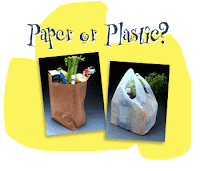 Here’s a dialog that takes place at the check-out counter at a grocery store:
Here’s a dialog that takes place at the check-out counter at a grocery store:
Speaker A: Hello. How are you?
Speaker B: Fine and you?
Speaker A: Fine. Paper or Plastic?
Speaker B: Plastic, please.
Speaker A: Do you have your discount card?
Speaker B: Sure, here it is. (Hands card.)
Speaker A: That will be 10 dollars and 51 cents.
Speaker B: (Runs her credit card on the credit card machine)
Speaker A: Is that a credit card or ATM card?
Speaker B: Credit.
Speaker A: Thank you, have a nice day!
Speaker B: Thank you. You too.
This is a very typical conversation that you would have with a check-out person at a grocery store in the United States.
paper or plastic – This refers to the type of bag you receive. Some people have switched to bringing their own re-useable bags. But, no matter which grocery store you go to, they will either ask you “Paper or Plastic?” or they will say, “Is plastic okay?”
discount card – For some odd reason in the United States, in the Southern States, the grocery stores each have an individual discount card. You have to use the discount card in order to receive the weekly discounts. In other states like Texas, these cards do not exist. Anyone would receive the weekly discounts.
credit card or ATM – ATM means Automated Teller Machine. The money from the ATM card comes directly out of your bank account. If you use an ATM card or pay by check you could take additional money out of your account and receive it there at the grocery store. They would ask you, “Would you like cash back?”

 It’s sweltering hot outside and you need some relief. In the distance you see a ice cream parlor. “Perfect,” you think. This is just what I need. You walk into the ice cream shop and you see a gazillion different flavors. Uggghhh, how will you chose? What will you say?
It’s sweltering hot outside and you need some relief. In the distance you see a ice cream parlor. “Perfect,” you think. This is just what I need. You walk into the ice cream shop and you see a gazillion different flavors. Uggghhh, how will you chose? What will you say? 